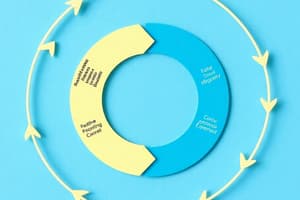Podcast
Questions and Answers
What are the three sectors in the circular flow model of a simple economy?
What are the three sectors in the circular flow model of a simple economy?
- Households, government, and foreign sector
- Business firms, government, and foreign sector
- Households, business firms, and foreign sector
- Households, business firms, and government (correct)
What does the Production Possibility Frontier (PPF) represent?
What does the Production Possibility Frontier (PPF) represent?
- The different combinations of goods and services a country can produce (correct)
- The rate of inflation in an economy
- The total value of goods and services produced in an economy
- The level of unemployment in an economy
The circular flow model represents the flow of goods and services between different sectors of an economy, including _______________________, business firms, and the government.
The circular flow model represents the flow of goods and services between different sectors of an economy, including _______________________, business firms, and the government.
households
The Production Possibility Frontier (PPF) can shift upward due to _______________________ or technological improvements.
The Production Possibility Frontier (PPF) can shift upward due to _______________________ or technological improvements.
The circular flow model includes only two sectors: households and business firms.
The circular flow model includes only two sectors: households and business firms.
The Production Possibility Frontier (PPF) is fixed and cannot change.
The Production Possibility Frontier (PPF) is fixed and cannot change.
What are the main economic problems faced by a simple economy with only households and business firms?
What are the main economic problems faced by a simple economy with only households and business firms?
Match the production combination with the respective quantity of goods produced:
Match the production combination with the respective quantity of goods produced:
Flashcards are hidden until you start studying
Study Notes
Circular Flow Model
- Represents the flow of goods and services between sectors in an economy.
- Key sectors include households, business firms, and potentially government or foreign sectors.
- Households supply labor and consume goods/services.
- Business firms produce and distribute goods/services.
- Highlights interdependence between different economic agents.
Production Possibility Frontier (PPF)
- Illustrates the different combinations of two goods or services a country can produce with available resources.
- Reflects opportunity costs and trade-offs in production decisions.
- Can shift upward due to improvements in resources, technology, or productive efficiency.
- Represents maximum potential output of an economy.
Opportunity Cost
- Defined as the lost benefit from choosing one alternative over another.
- In the case study of two goods (X and Y), producing more of one good (X) incurs an opportunity cost measured in terms of the other good (Y).
Free Enterprise vs. Command Economy
- Free enterprise economy: Market-driven, decisions made by individuals or businesses based on supply and demand.
- Command economy: Centralized control where government makes decisions about production and distribution of resources.
- Key differences include resource allocation, price determination, and individual economic freedoms.
Case Studies Overview
-
Case Study 1: Simple economy with households and business firms.
- Analyze economic roles of households and firms, and implications of limited government involvement.
-
Case Study 2: A company producing goods X and Y with defined production limits.
- Opportunity costs and production trade-offs are central themes.
Question Types Summary
- Multiple Choice: Assess understanding of economic models and concepts.
- Fill in the Blanks: Test comprehension of key concepts like the circular flow model and PPF.
- True or False: Evaluate knowledge of foundational economic principles.
- Descriptive: Encourage detailed explanation and critical thinking regarding economic concepts and their implications.
Studying That Suits You
Use AI to generate personalized quizzes and flashcards to suit your learning preferences.




